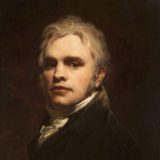Constitution Day inspired these reflections because the day and the document are no longer so great. I am staring at a soup tureen of late 18th-century provenance, made in China. More precisely, this tureen was made in Guangzhou, formerly known in the West as Canton.
In 1780, as today, China commanded one of the largest economies in the world. As today, Guangzhou housed giant manufacturing facilities, producing for export quantities of goods that exceeded anything known in the West.
The “Fitzhugh” pattern of the tureen gets its name from Thomas Fitzhugh, a director of the massive trading monopoly, the East India Company. Fitzhugh in 1780 purportedly ordered a large quantity of porcelain for export to Europe and the United States, bearing a traditional Chinese four-quadrant design in green, brown, and blue.
To enhance appeal in the targeted markets, the Chinese factories emblazoned badges of various royal houses on porcelain destined for Europe. Fitzhugh porcelain destined for the United States market, in place of a royal badge, bore an eagle, shield, and a banner reading E Pluribus Unum.
Out of many, one. Our national motto is easy to say but hard to do.
In the Gettysburg Address, Lincoln asked whether “any nation so conceived [in liberty], and so dedicated [to the proposition that all men are created equal], can long endure.” Why did Lincoln generalize? Were not the problems of the American Civil War, rooted in slavery, unique to America?
Following the American Revolution, the most prominent attempt to establish a regime similarly conceived—on the proposition of liberty and equality—had failed. The French Revolution devolved into the Terror, and then into Bonapartism, then to the restoration of the Bourbon monarchy.
Lincoln knew the weakness of popular republics. Popular republics tend to divide. If a nation is founded on consent, derivative of equality, why can’t such consent simply be withdrawn when a party determines that union, oneness, unum, is no longer in their interest, however peculiar?
Lacking a monarch, the United States Constitution is the focal point of that oneness. Washington was explicit about this in his farewell address:
The basis of our political systems is the right of the people to make and to alter their constitutions of government. But the Constitution which at any time exists, until changed by an explicit and authentic act of the whole people, is sacredly obligatory upon all.
Before the American Civil War, the Constitution had been amended 12 times. The last amendment was ratified in 1804. No amendments were ratified in the 54 years leading up to the rupture in 1860. Two generations came into being, and two passed away without an affirmative act of consent by the whole people. And the war came.
From 1865 to 1992, the Constitution was amended an additional 15 times. But 1992 represents an anomaly. The 27th Amendment was proposed in 1789 and lay around on the cusp of ratification for more than 200 years before Michigan ratified, putting the 27th Amendment over the top.
If one excludes this anomaly, the last time the Constitution was amended was 1971, 51 years ago. Two generations have come, and two have passed without a soup-to-nuts amendment, in which the soup was close enough to the nuts that consent would not starve to death in between.
In lieu of amendments ratifying consent, the Supreme Court has busied itself expanding rights under a “living constitution.” Wonderful, but expanding constitutional rights—ignoring for the moment their concurrent and increasingly habitual abuse—without the amendment process has the practical effect of crowding out the most fundamental right: consent.
In China, a narrow elite today makes the rules. The great innovation of 1776 was the whole of the people make the rules, for better or for worse. When the Supreme Court makes the rules—or when the executive makes the rules for that matter—America is more like China and less like the ideas celebrated in the Gettysburg Address or in Washington’s Farewell Address.
If Constitution Day has meaning it should be to encourage the whole people to amend the Constitution to bring it current. One could start by codifying or overriding the usurpations of the Supreme Court, and adding new protections under Bill of Rights against warrantless searches, arbitrary detentions, and usurpations of due process.

